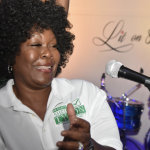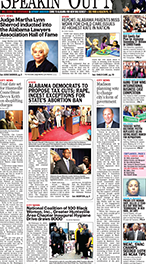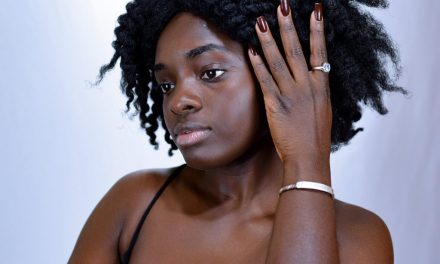By Sean Yoes,
Special to the AFRO
In the early morning hours of Veteran’s Day with the sun still far from the horizon, The Rev. Robert Turner, pastor of the Empowerment Temple AME took the first steps of a daunting journey; a more than 42-mile walk from Baltimore’s Carroll Park, to the front gate of the White House in Washington D.C.
For most, walking 42 miles would be a once in a lifetime trek. However, this is the second time in two months that Pastor Turner, 40, has made this physical sacrifice with one overarching goal in mind; to bring attention to the long discussed issue of reparations for more than 400 years of oppression of Black Americans.
Pastor Turner, who has led the venerable Northwest Baltimore church since September 2021, told the AFRO that he is prepared to endure the 42 mile odyssey once a month, indefinitely under the banner of #RUNMovement. RUN stands for “Repair Us Now.”
“First, is the spiritual witness of standing for truth and standing for justice and standing for righteousness. And the physical witness, just as our forefathers, you know they did not take shortcuts,” Turner said during a phone interview a couple of days after his Veteran’s Day march. “We could all drive, we could ride bikes, we could fly. But, there were no shortcuts in the plight and travail of our ancestors…we weren’t given anything free. I know this 42 mile walk is nothing in comparison to 400 years of oppression,” he added.
“It (the walk) is a sign of when on the cross Jesus turned down the vinegar to numb the pain, turning down the creature comforts. And making a spiritual public witness to the harms of White supremacy and the lack of justice for African Americans.”
Before coming to Baltimore in 2021, with his wife and their two sons to take the helm at Empowerment Temple, Turner was Pastor of the Historic Vernon AME Church in Tulsa, Oklahoma starting in 2017. Vernon AME was one of only a few buildings left standing in the wake of the Tulsa race massacre, which began May 31, 1921, and concluded June 1, 1921. During that Memorial Day weekend in 1921, a murderous White mob destroyed the Greenwood business district (more than 35 square blocks) of Tulsa’s Black community, an area known as “Black Wall Street,” one of the wealthiest Black communities in America.
According to the Tulsa Reparations Coalition up to 300 people, most of them Black were killed during the massacre and dozens of Black businesses and homes were burned to the ground. Around the time of the 100th anniversary of the Tulsa massacre, Turner, a native of Tuskegee, Alabama, led weekly marches demanding reparations in front of Tulsa City Hall. The protests garnered national attention.
For Turner, that ministry demanding repair of Black communities across the nation continues in Baltimore.

“It (the walk) is highlighting the fact that nothing has been done since 1526 (Turner and others contend that African slaves were brought to North America almost 90 years prior to the generally accepted arrival date of the first Africans to the shores of North America in 1619) to repair the harm and hardship that African Americans have endured from slavery, to Black Codes, to racial terror, to Jim Crow, to chain gang convict leasing, to mass incarceration, to police brutality. Nothing has been done really to alleviate any of that,” Turner said.
Perhaps the foundational question at the root of the #RUNMovement is what does repair of the Black community look like after enduring centuries of atrocities and punitive policies?
“America has never studied the worst sin, the worst crime in her history. It shows just how much she cares about Black people. I think HR40 is a great start,” Turner said in reference to U.S. House Resolution 40 (H.R. 40), which would establish a federal commission to examine the impacts of the legacy of slavery and recommend proposals to provide reparations.
“We have a Democratic president. If it (H.R. 40) does not go through the House and the Senate, he can sign an executive order to have the study bill, move the study bill into law,” Turner added. “And from that bill we can see more concrete efforts of repair. I have specific ideas about repair…definitely monetary, also health, also education, also mental health is a big issue. Because we’ve never had any type of mental health treatment from the trauma of the Black experience.”
At around 7:30 p.m. after more than 42 miles by foot and approximately 15 hours after he began, Turner arrived at the front gate of the White House. Yet, before the November walk was completed, Turner had already committed to walking from Baltimore to D.C. in December.
How long does he plan to keep walking to uplift the #RUNMovement?
“Until the Lord tells me to stop.” Turner said. “I feel that I am alive for such a time as this and for this purpose.”
Help us Continue to tell OUR Story and join the AFRO family as a member –subscribers are now members! Join here!
The post FaithWorks -AFRO Exclusive: Baltimore Pastor Walks for #RUNMovement appeared first on AFRO American Newspapers .










